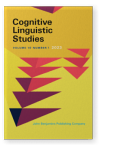Vol. 10:1 (2023) ► pp.117–145
Metaphors and pseudometaphors of language as controversial messages in public discourse about Serbian
Set in the contemporary public discourse about the Serbian language, this paper demonstrates how metaphors of and about language constructed with the source domains of violence and war (e.g., language occupation, language as battlefield, to fight for language) may serve nationalistic political aims and act as conflict-inciting messages, under the pretenses of typical language purism or ‘language care’. The concept of pseudometaphor is introduced as a figuration-based discursive strategy whereby metaphors for language, underpinned by the language-language users metonymy, may serve as tools for covertly conveying controversial messages about their respective language users. The analysis covers public discourse published in a span of eight years (2010–2018), involving institutionalized language and political campaigns, and less institutionalized public language debates. As convergent evidence for pseudo-metaphoricity of the language-war/violence metaphors and their potential for instigating inter-ethnic conflict, the analysis includes critical voices that expose the dominant ideology through literalization of their metaphorical models.
Article outline
- 1.Introduction
- 2.Theoretical background
- 2.1Language – language users – nation: Romantic and rationalist models of language revisited
- 2.2Metaphor and metaphorical representations of language
- 3.Serbian, post-Yugoslav sociolinguistic context
- 4.Corpus and method for metaphor identification
- 5.Analysis
- 5.1
violence as death
- 5.1.1 violence as division and dispossession
- 5.2 striking, battling, and reading as a type of language care
- 5.3Exposing pseudometaphoricity of the dominant ideology through literalization
- 5.1
violence as death
- 6.Discussion and conclusion
- Notes
-
References
